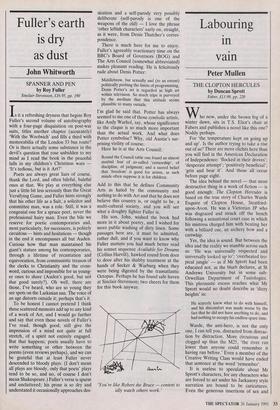Fuller's earth is dry as dust
John Whitworth
SPANNER AND PEN by Roy Fuller
Sinclair-Stevenson, £16.95, pp. 190
Is it a refreshing dryness that begins Roy Fuller's second volume of autobiography with a four-page disquisition on post-war suits, titles another chapter (accurately) `With the Woolwich' and fills a third with memorabilia of the London 53 bus route? Or is there actually some substance in the devil's question that rose unbidden to my mind as I read the book in the peaceful lulls in my children's Christmas wars 'It's tedious, but is it Art?'
Poets are always great liars of course, thank the Lord, and often bileful, baleful ones at that. We play at everything else just a little bit less seriously than the Great Versifying Game, and Fuller hints strongly that his other life as a Suit, a solicitor and committee man, was a role. Still, it was a congenial one for a spruce poet, never the professional hairy man. Even the bile we reserve for poetic contemporaries and, most particularly, for successors, is politely circuitous — hints and hesitations — though in the end it encompasses all but Auden. Curious how that man maintained his giant's stature among his contemporaries, through a lifetime of recantation and equivocation, from communistic treason of the clerks to Christianity and the cross- word, curious and impossible for us young- er ones to share (Auden's good, but not that good surely?). Oh well, there are those, I've heard, who are so young they see spots on the Larkinian sun. The voice of an age distorts outside it; perhaps that's it.
To be honest I cannot pretend I think these scattered memoirs add up to any kind of a work of Art, and I would go further and say that even those novels of Fuller's I've read, though good, still give the impression of a mind not quite at full stretch, of a spirit not entirely engaged. But that happens; poets usually .have to write something or other between the poems (even reviews perhaps), and we can be grateful that at least Fuller never descended to bloody plays. (I don't mean all plays are bloody, only that poets' plays tend to be so, and no, of course I don't mean Shakespeare.) Fuller's verse is sparse and uncluttered; his prose is so dry and understated it occasionally approaches des- sication and a self-parody very possibly deliberate (self-parody is one of the weapons of the old) — I love the phrase `other leftish characters' early on, straight, as it were, from Denis Thatcher's corres- pondence.
There is much here for me to enjoy. Fuller's 'agreeably reactionary time on the BBC's Board of Governors (BOG) and The Arts Council (somewhat abbreviated) makes pleasant reading. He is felicitously rude about Denis Potter:
Middlebrow, but sexually and (to an extent) politically probing the limits of programming, Denis Potter's art is regarded as high art within television. So much tripe is purveyed by the medium that this attitude seems plausible to many outside.
I'm glad he said that. Potter has always seemed to me one of those symbolic artists, like Andy Warhol, say, whose significance to the claque is so much more important than the actual work. And what does Potter symbolise? Why, old Auntie's sur- prising virility of course.
Here he is at the Arts Council:
Round the Council table one found an almost morbid fear of so-called 'censorship', of discipline, of judgment; and a sacred belief that 'freedom' is good for artists, as such minds often suppose it is for children.
Add to this that he defines Community Arts as hated by the community and nothing to do with Art and that he does not• believe this country is, or ought to be, a multi-cultural society, and you will see what a doughty fighter Fuller is.
His son, John, wished the book had more in it about poetry, and I wished for more public washing of dirty linen. Some passages here are, it must be admitted, rather dull, and if you want to know why Fuller matters you had much better read his sonnet sequence Available for Dreams (Collins Harvill), hawked round from door to door after his shabby treatment at the hands of Secker & Warburg when they were being digested by the transatlantic Octopus. Perhaps he has found safe haven at Sinclair-Stevenson; two cheers for them for this book anyway.
'You're like Robert the Bruce — content to idly watch others work.'


























































 Previous page
Previous page